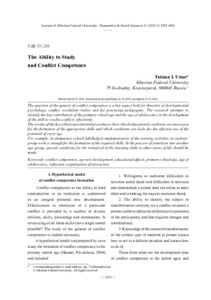Умение учиться и конфликтная компетентность
Скачать файл:
URI (для ссылок/цитирований):
https://elib.sfu-kras.ru/handle/2311/3125Автор:
Юстус, Т.И.
Ustus, Tatiana I.
Дата:
2012-12Аннотация:
The question of the genesis of conflict competence is a key aspect both for theorists of developmental
psychology, conflict resolution studies and for practicing pedagogues. The research attempts to
identify the key contribution of the primary school age and the age of adolescence in the development
of the skill to resolve conflicts effectively.
The results of the described experimental procedures show which educational conditions are necessary
for the formation of the appropriate skills and which conditions are lacks for the effective use of the
potential of every age.
For example, in elementary school full-fledged implementation of the training activities in students
group work is enough for the formation of the required skills. In the process of transition into another
age group, special conditions for the transferal of the learning skills to other areas of life should be
made. Вопрос о генезисе конфликтной компетентности является одним из ключевых как для
теоретиков психологии развития и конфликтологии, так и для педагогов-практиков. В статье
предпринята попытка обнаружения ключевых вкладов младшего школьного и подросткового
возрастов в развитие умения эффективно разрешать конфликты.
Результаты описанных экспериментальных процедур показывают, какие образовательные
условия необходимы для формирования соответствующих умений и каких условий не достает
для эффективного использования возможностей каждого возраста. Так, в начальной школе для
формирования требуемых умений достаточно полноценной реализации учебной деятельности
в групповой работе школьников. При переходе же в следующий возрастной этап необходимо
специальное построение условий для переноса навыков из учебной во внеучебную сферу.
Коллекции:
Метаданные:
Показать полную информациюСвязанные материалы
Показаны похожие ресурсы по названию, автору или тематике.
-
A.P. Ermolaev and the First Description of Archaeological Collection of the Krasnoyarsk Museum
Malitskaya, Anna A.; Makarov, Nikolai P.; Vdovin, Alexanrer S.; Малицкая, А.А.; Макаров, Н.П.; Вдовин, А.С. (Сибирский федеральный университет. Siberian Federal University, 2015-04)The article represents biography of the Krasnoyarsk city museum conservator assistant A.P. Ermolaev. A brief review of his scientific activity as an archaeologist is given. On the basis of little known archival data, ... -
Decapitations in Late Bronze Age and Iron Age sites from Sevan region (Armenia)
Khudaverdyan, Anahit Yu.; Худавердян, А.Ю. (Сибирский федеральный университет. Siberian Federal University., 2014-09)The fact that rituals involving the sacrifice of people were present within the cultures of Late Iron Age Armenia has long been known. The purpose of this paper is to dig further towards the sociocultural reasons behind ... -
Гендерные различия женщин 40-60 лет в России и Австралии
Ovsyanik, Olga A.; Овсяник, О.А. (Сибирский федеральный университет. Siberian Federal University., 2013-02)This is a research on adaptation of woman of 40-60 years old according to gender characteristics. Women were tested by BSRI and author’s topic–guide. The research was conducted among Australian and Russian women (406 ... -
Керамика позднего бронзового - раннего железного веков стоянки Красный Яр II (северо-западное побережье озера Байкал)
Кичигин, Д.Е.; Kichigin, Dmitry E. (Сибирский федеральный университет. Siberian Federal University., 2011-01)Настоящая статья посвящена анализу «шнуровой» и «вафельной» керамики стоянки Красный Яр II. Исходя из стратиграфических особенностей залегания этих культурных остатков и типологических сходств с материалами соседних регионов, ... -
Conditions for Ensuring Psychological Health of Family and Child
Safonova, Marina V.; Gruzdeva, Olga V.; Verbianova, Olga M.; Kovalevskiy, Valerii A.; Сафонова, М.В.; Груздева, О.В.; Вербианова, О.М.; Ковалевский, В.А. (Сибирский федеральный университет. Siberian Federal University, 2019-12)The article discusses the outcomes of the current child development environment survey: socio-demographic and cultural characteristics of the family, leisure activities of the family, involvement of young students in the ...

